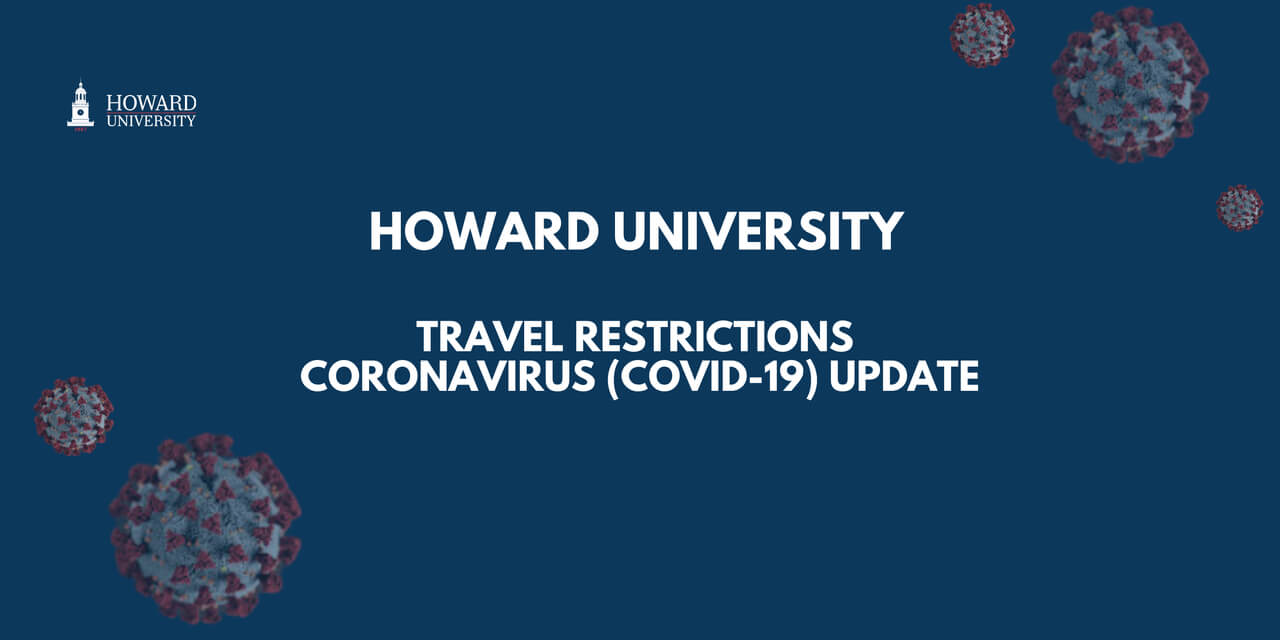
Dear Howard University Community,
The University continues to closely monitor the spread of COVID-19, also known as the coronavirus. This week, the first confirmed cases of COVID-19 were diagnosed in Maryland. Governor Larry Hogan declared a State of Emergency in order to ramp up Maryland’s coordinated response across all levels of government. There are no confirmed cases at Howard University, or in Washington, D.C. at this time.
Effective immediately, we will be taking the additional and difficult step of suspending all University-supported non-essential international travel for students, faculty, and staff, secondary to rising concerns regarding the coronavirus outbreak. This includes future group trips, spring break programs and individual travel. It also includes requests for approval of future international travel and remains in place until further notice. Beyond the actual health risks, we are increasingly concerned about travel restrictions being implemented that may impact the return of individuals engaged in international travel. In addition to potential restrictions that may be under consideration by the federal government, foreign governments are also imposing additional border and travel controls.
In consideration of sponsored research projects, research-related travel for faculty, supported by external funding agencies, will continue to be considered on a case by case basis. We strongly discourage personal travel to jurisdictions with a CDC Level 3 (Avoid Non-essential travel) Travel Warning. Any traveler returning from these countries is subject to a 14-day period of self-isolation at home, or other location separate from campus. If you decide to travel, please be aware that there may be limited health resources in those areas, if they are affected by coronavirus. You may be subject to governmental travel restrictions with little or no notice, and airlines may limit or cancel flights without warning. You will be subject to any restrictions in place at the time of your return, not only at the time of departure. Return to the U.S. may be difficult, and after your arrival, you may be required to stay away from campus temporarily.
We understand that these travel restrictions and the uncertainty surrounding the spread of COVID-19 may be disruptive and disappointing to the members of our community, and we want to thank you for your understanding as we take the necessary steps to protect your health and safety. We expect this public health concern, and our response will continue to evolve. As it does, we will keep you informed and continue to offer the support and resources needed.
Everyone in our community is advised to practice appropriate hygiene and preventive measures to prevent the spread of viral illness on campus.
Currently, there is no vaccine to prevent COVID-19 (known as coronavirus). The best way to prevent illness is to avoid being exposed to this virus. However, the CDC always recommends everyday preventive actions to help prevent diseases from spreading, including:
- Avoid close contact with people who are sick.
- Avoid touching your face, particularly your eyes, nose, and mouth.
- Stay at home when you are sick.
- Cover your cough or sneeze with a tissue, then throw the tissue in the trash. If no tissues are available, cough or sneeze into your elbow.
- Clean and disinfect frequently touched objects and surfaces using a regular household cleaning spray or wipe.
- Follow the CDC’s recommendations for using a facemask.
- The CDC does not recommend that people who are well to wear a facemask to protect themselves from respiratory diseases, including COVID-19.
- Facemasks should be used by people who show symptoms of COVID-19 to help prevent the spread of the disease to others. The use of facemasks is also crucial for health workers and people who are taking care of someone in close settings (at home or in a health care facility).
- Wash your hands often with soap and water for at least 20 seconds, especially after going to the bathroom; before eating; and after blowing your nose, coughing, or sneezing.
- If soap and water are not readily available, use an alcohol-based hand sanitizer with at least 60% alcohol. Always wash hands with soap and water if hands are visibly dirty.
- Contact the telemedicine service, HealthiestYou, to speak to a physician for medical advice www.telehelp4students.com. The site offers 24/7 online access to physicians for medical conditions (HealthiestYou) and mental health professionals/psychologists (BetterHelp) for mental health care. Use your student resource ID for access. Website: http://go.healthiestyou.com/student/.
We will continue to provide regular updates as the situation evolves.
In Truth and Service,
Anthony K. Wutoh, Ph.D., R.Ph.
Provost and Chief Academic Officer




